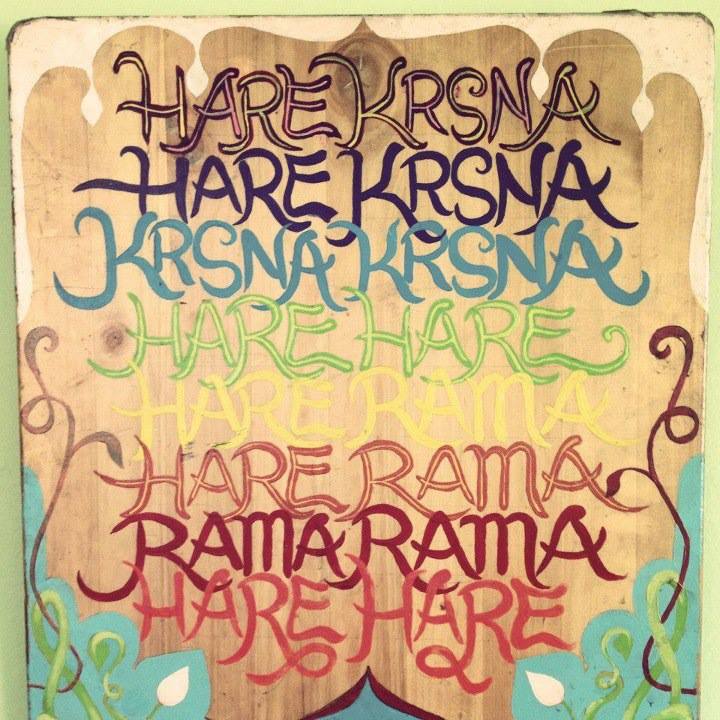
In my question which forms the title of this blog, I am using the word “religious” to indicate a person who is only a “part time devotee”, or whose practice of Krishna consciousness is sort of on the back burner—only one of many interests. It is important to think about this for both a new person just beginning their spiritual life in relationship to Krishna and for those who have been involved with bhakti or Krishna consciousness for many years, or even decades.
I will give you my personal experience. When I first embraced this path of Gaudiya Vaishnavism, I was in the middle of an existential crisis to find the meaning of life and my place in the world. I didn’t seem to fit in to the worldly status quo and had come to realize that the life or culture I grew up believing in was terribly skewed and irrelevant to me. I didn’t know where I fitted in to this life. I became disinterested in all the trappings of modern materialistic culture, and spent much of my time alone, in the wooded, secluded country, reading spiritual books, and wondering who I or anyone was in the bigger cosmic scheme. Some of my teachers were the stars, moon, and sun, the redwood trees, the cycles in Nature, and the questions that begged to be answered.
This was not a casual search, but my burning quest to make sense of what seemed a purposeless existence. I did find encouraging clues in Nature, and in spiritual books that I had never before been interested in. I came to the point where it seemed that the best way to delve into spirituality was to become a monk in some tradition so I could be absorbed in study and spiritual practice without any worldly distractions.
Meeting the devotee of Krishna and visiting a temple for the first time felt like coming home, or a “déjà vu” type of experience. After a short time of associating with the devotees and reading the Gita, it was an easy decision to give away my few possessions and become a monk. I can say that for many years I was fully immersed in living a spiritual life, though I no longer had the fire of my previous inquisitiveness. I didn’t know it, but I was becoming a “religious” person. I can see that this was partially due to my history of being a rather dull, non-reflective person, and because I was so busy that I practically forgot my original motivations. I wondered why my life was now so hectic and I wasn’t peaceful or settled.
This demonstrates the importance of continual renewal in our spiritual life, continual study of the teachings, and in keeping inspiring association with devotees more advanced then you, who are dedicated to obtaining the spiritual goal—which in our case is being absorbed in remembering, loving and serving Krishna and his devotees. I was also young, and in youth one may do many types of austerities, such as going to college, being in the military, or being dedicated to humanitarian causes. Whatever the reasons for my lack of spiritual fire, I couldn’t remain as a single person, and thus I married. As we all know, being married means creating a means to maintain one’s family and home. After so many years of serving the mission, I found this quite a challenge.
Although I continued chanting Hare Krishna on my beads (japa) and my minimal spiritual practices I can’t say Krishna consciousness was my burning obsession. I was more interested in making peace with my past growing up, trying to find myself physically, and in developing an occupation. In devotee lingo we might use this as a testimony to the need for Varnashram, or the ancient system of training the population occupationally in a way that was also favorable for their spiritual progress.
There is no doubt that one has to find themselves materially in order to be peaceful and find fulfillment by using one’s natural talents. If we can dedicate this to Krishna’s service, we have a balanced, happy life. In any case, for the purposes of this blog, I was mainly a “religious” devotee. It has only been in the last 10 years that I can say that my spiritual life has become more of my focus in life. This is a meant to be the natural progression of life after the children are grown and one has more time for a spiritual emphasis in their life. With the slow decline of our body it is obvious that our time here is limited, and we must make progress toward our spiritual objectives.
For most devotees, in married life, it is more difficult to devote as much time to their spiritual life as do those who are single monastics. However, if one has imbibed the spirit of the Vedic teachings, our spiritual goal will never go far from our mind and heart, regardless of family responsibilities. As I have spoken of before, we can still dedicate our activities to Krishna regardless of our life’s primary external activity. Our intention for living and acting, as well as our spiritual ideal are all important.
Prabhupada calls this the great “art of doing work”, and it requires keeping good association, regular spiritual practice (sadhana), a lot of prayer, and a philosophical mind as we observe life. We also need to continually recommit to our goal, and take stock of how we are progressing spiritually—or not—and how we can improve. If we can do this we don’t have to be only a religious devotee, but we can be a true “grihastha” or spiritually dedicated householder. Or like me, after some time, we can again make spiritual life our magnificent obsession, or primary goal in life.
